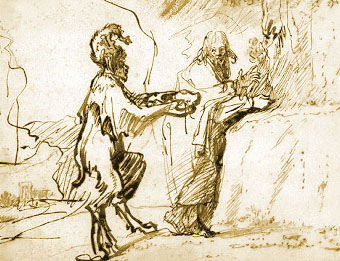|

| |
MOVEMENTS OF THE SPIRITS
Please click here to subscribe to The
Way, To download a free sample article from this issue in
Word format, click here, Contents The Office of Consoling For Ignatius, the risen Christ ‘consoles’ his friends. José García explores the links between Ignatian consolation and the Easter experience of the first disciples. Spiritual Desolation in Today's World An overview of what Ignatius says about desolation, followed by some reflections on how desolation influences our contemporary culture. What We Learn From Desolation A commentary on the ninth of Ignatius’ First Week Discernment Rules, exploring the various good things that can come from desolation. Download this article in
Word format by clicking here, From the Ignatian
Tradition: One of Ignatius’ closest confidants on consolation, on ministry and on discernment. Spiritual Consolation and Envy Consolation can easily be disrupted in good people, and one frequent manifestation of such disruption is envy, a besetting sin of religious establishments. Ignacio Iglesias charts this process, and also the possibilities for new regeneration. Angels of Light and Darkness Ignatius’ rhetoric of light and darkness is dualist, and as such problematic. Angels as the ‘voice of God’ may be nothing more than the internalised voice of the prevailing social order. The Spirit in Contemporary
Culture: Is it right that crucifixes may be displayed in schools funded by the State? Is it appropriate for Muslim women who are civil employees to wear the headscarf on duty? Such issues have recently led to conflict in a number of countries. Tony Carroll here explores how a balance can be struck between tolerance and social cohesion. Reducing Yourself to Zero: Jean Sulivan’s Anticipate Every Goodbye As France became a fully secular society, the discovery of God came to be a marginal, fragmentary affair. Eamon Maher explores how these changes are reflected in the work of Jean Sulivan (1913-1980), the French priest and writer. Theological Trends: In 1999, the Catholic and Lutheran Churches published a Joint Declaration proclaiming considerable convergence on the doctrine of justification, commonly thought to be the central point of dispute at the Reformation. But many Lutheran theologians have felt that the Declaration fails to do justice to Protestant concerns. Book Reviews
on Jerónimo Nadal and engravings of gospel
scenes
on Patrick Purnell’s new collection of poems, Imagine on official Roman Catholic teaching regarding homosexuality on an important new book about contemplative prayer on James Alison’s new collection of Girardian essays on Evagrius of Pontus, a great figure from early Christianity looking at some Irish essays on social spirituality on parish priests, and their needs and aspiriations on a new study of group spirituality on the Salesian tradition on how Mary Magdalene was marginalised in early Christianity on interpreting the Bible on the seminal Puritan figure, Jonathan Edwards on John of Damascus on ecology and transformation on a study of holiness by John Webster, the eminent Protestant theologian From the Foreword MEDITATION ON GOD’S WORD now seems so central to Christianity that we can easily forget how much that practice depends on an invention of early modernity: the printing press. Ignatius and the classical Reformers lived in the first generation for whom the printed word was an everyday reality. Perhaps it is no coincidence that they both now appear as harbingers of a new form of religious consciousness. Both discovered in the printed text a divine Word, confronting their guilt and ambiguities with an experience of grace as wholly other, as undeserved, as beyond our control. One effect of their discoveries was a split within Western Christianity over how this experience was to be understood and over what it implied about the relationship between the individual and Church authority. But one factor was common: a sharpened sense of the self as somehow essentially dialogical, essentially in confrontation:It is no longer I who live, but it is Christ who lives in me. And the life I now live in the flesh I live by faith in the Son of God, who loved me and gave himself for me. (Galatians 2:20)Ignatius called this kind of experience of the sheer grace of God ‘consolation’, and contrasted it with the ‘desolation’ that results from self-obsession and self-absorption. This issue of The Way centres on four acclaimed articles first published last year in Spanish by our sister journal, Manresa, and here reproduced in slightly adapted form. They explore how people today experience consolation and desolation, in a society and in a Church far different from anything that Ignatius could imagine. Perhaps a spirituality centred on the experience of the wholly other God is in the end a spirituality specific to modernity. Feminism, ecological awareness, sensitivity to the grace of God outside Christianity—all these factors may be leading us decisively beyond the spiritualities inaugurated in the sixteenth century. Just as the printing press led to one revolution in religious consciousness, perhaps telecommunications and the internet are provoking another, and our spiritual future is indeed radically different. Yet even if that claim is true, there is more to this number of The Way than idle nostalgia. If we are to reconceive our discipleship decisively, an awareness of our past is the first step towards freedom from it. But then again, perhaps it is not a question of abolition but of fulfilment. Perhaps the spirituality for a postmodern world will not, after all, set aside what we have inherited both from Ignatius and (in their way) from the great Reformers. Perhaps, rather, it will set religious modernity’s sense of the spirits’ movements within richer, more inclusive contexts. Philip Endean SJ
Please click here to subscribe to The
Way, | ||



